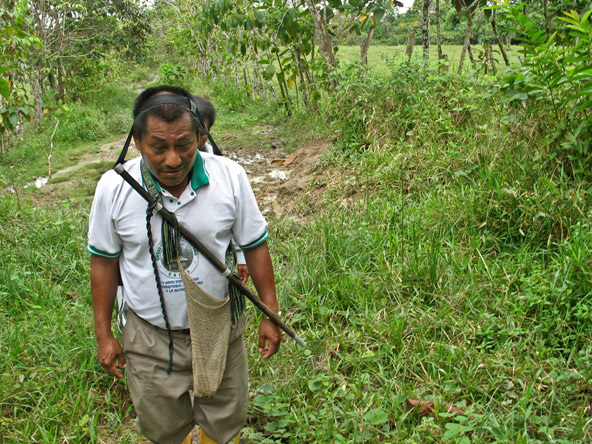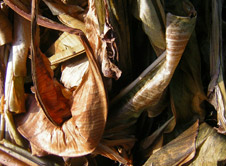
June 2007. Narino, Colombia. A tribal Awapi leader on native land in a zone where FARC rebels, rightwing paramilitaries and Colombian Armed forces operate.
Photo: Phillip Robertson
In the late eighties, the ancestor of the AUC began as an extreme right wing confederation of armed bands, largely funded by cocaine trafficking, which fought the FARC across large regions of Colombia. Naturally, their political interests were allied with the Colombian government, which also wanted to destroy the FARC-but, unlike the army, the AUC could operate without restrictions. In the space of a few short years, the AUC would be responsible for the vast majority of political killings in the country and the group's leaders would boast that a significant percentage of the nation's legislators were under their direct control. From 2000 to the end of 2002, there were at least 11,500 political killings in Colombia, most of which the AUC committed. It was a long running human rights nightmare.
In 1997, shortly after the AUC arrived in Urabá, it began to consolidate power through a series of massacres and assassinations to drive out the FARC, which had organized in the banana fields. Swept up in the paramilitary net were civilians who had no connection to any armed groups. A large number of villagers and workers were summarily executed after being tortured or fingered as sympathetic to the FARC. Many of the killings took place around river towns. AUC gunmen would arrive, assemble the villagers in a central place and begin to interrogate them. Often, they were killed regardless of their answers. Establishing guilt in this system is just a pretext for widespread murder. It was a tremendous success. Eventually, the AUC controlled the entire banana growing region of Urabá, any leftist agitators were in hiding, and the AUC had access to the Chiquita port. They controlled it, but the commanders were still engaged in a brutal fight for control of the banana and coca fields. They faced a serious logistics problem. The paramilitary group was winning, but it badly needed war material to expand its influence.
Four years after the AUC arrived in Urabá, a mysterious shipment of thousands of AK-47 assault rifles and millions of rounds of ammunition arrived at the Chiquita docks on November 5, 2001, a lethal cargo that went directly to the AUC commanders. Aside from an Organization of American States (OAS) report that focused on the two Israeli arms dealers who arranged the deal from Guatemala and Panama, there have been few details to emerge about how the weapons were handled on the Colombian side. It is also true that people directly associated with the shipment have a tendency to disappear. The Mexican captain of the Otterloo, Jesús Iturrios Maciél, sailed with the ship on November 9th to Baranquilla and then vanished. The shipping company that owned the Otterloo closed its offices in Panama a few days after news of the weapons broke in a Colombian newspaper. The information in the OAS report suggests that someone formed the company just to deliver the weapons to the AUC.
In a front-page deal reached with the US government this year, Chiquita pleaded guilty to making millions of dollars in payments to a group on the State Department list of foreign terrorist organizations: the AUC. Lawyers for the company argued that they were forced into the making payments out of fear for the safety of its workers. Chiquita also admitted that they had a similar arrangement with the FARC. The result of the plea deal was a $25 million fine for a business that earned $3.9 billion in revenue in 2006, and there were no charges filed over the weapons shipment. It is not surprising that Chiquita Brands was forced to make protection payments to armed groups operating around their plantations, but that is not the entire story.
In March 2007, Chiquita told CNN that the weapons shipment and the protection payments to the paramilitaries were unrelated. This may well be true-the weapons shipments to the AUC were connected to a dark series of events at the company's port. The Colombian government also cast doubt on the company's claims of being the victim of extortion by the AUC. Mario Iguaran, the Colombian Attorney General said. "It was a criminal relationship: money and arms for the bloody pacification of Urabá.
I first saw the AUC man sitting at the roof bar of the Almirante José Hotel, hunched over a beer. When a waiter walked close to him, the man looked him up and down, but the glance was sidelong and hooded. He didn't want anyone walking up next to him and looked nervous. In the darkness on the roof of the hotel, he said nothing for long periods and then spoke rapidly, slamming his hands down on the table. He said he felt betrayed and abandoned by his former commanders, he was broke, demobilizing didn't help him at all. Killings and vendettas followed him around, hovering over him wraithlike and invisible. I have noticed that all assassins have something in common and it is present in the dead look the AUC man gives the waiter. The girl behind the bar went into the back room. She didn't want to hear what he was talking about. It grew late.
I have changed the name of the AUC man Lorenzo to protect him from being killed by members of the paramilitary group, his former comrades. It is something he thinks about all the time, how talking about this subject is dangerous. In the distance there were veins of lightning in a mass of black clouds as a storm came in. Lorenzo was still hunched over the counter as if he was nervous about people seeing his face. The girl had come back to bring us more beer. We were drinking Aguilas and the night was winding down and I was half-listening to the conversation. Everyone else had gone downstairs. Carlos turned to me and said, "Is there anything you want to ask him before he goes home?"
"I want to know if he heard anything about a shipment of guns that arrived at the Chiquita docks." "Sure," Lorenzo said, "I was there. I supervised the unloading of the rifles." Everyone fell silent. We listened to sporadic gunfire coming from a nearby neighborhood. Finally, Lorenzo started to tell us how the weapons arrived, how they were packed and what he did that night, how he made sure his men put them on the trucks and that none were missing. They were disassembled and carefully sealed in plastic bags for the trip over the sea, tucked away in farm supplies in the containers. As he talked, there was another burst of gunfire. "Was there more than one shipment?" I asked him. "Yes. I heard there were others, but they didn't arrive at the Chiquita docks, they arrived somewhere else."
 LEAD IMAGE: Dried banana leaves.
LEAD IMAGE: Dried banana leaves.Photo: Unknown
© Phillip Robertson, 2009-2014.
